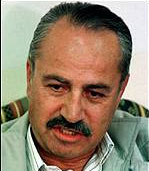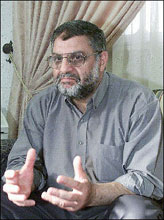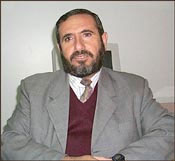|
Half Century Of Israeli Assassinations
 |
|
Bernadotte
was killed for advocating the return of Palestinians expelled from
territories captured for the establishment of Israel
|
By
Yasser Al Banna, IOL Correspondent
GAZA
CITY, August 22 (IslamOnline.net) – Killing Hamas political leader
Ismail Abu Shanab on Thursday, August 22, topped half a century of
assassinations – one of the most heavily-used weapons in the Israeli
arsenal. History can tell.
Even
before the creation of Israel, assassination was one of many tools
used by Jewish gangs to pave the ground for the would-be state.
On
July 22, 1946, they struck at the King David Hotel, the south wing of
which housed the British military command and the Mandatory government
secretariat, killing some 91 people, including 28 Britons, 41 Arabs.
On
September 1948, Jewish gangs assassinated U.N. envoy Conte Folke
Bernadotte simply because he called for the return of Palestinian
refugees expelled from territories captured for the establishment of
the fledging state of Israel.
Bernadotte
advocated a total demilitarization of occupied Jerusalem and blamed
Jewish forces for "aggressive" behavior in the holy city.
After
that, Israelis used to send booby-trapped packages to Arab and foreign
personalities on its hit list.
In
1956, the Israeli intelligence service (Mossad) sent a similar package
to Egyptian army officer Mostafa Hafez in Gaza, to eliminate a key
commander of resistance in Gaza City.

|
|
Abu Ali Mustafa was killed by Israeli Apaches |
Again,
in 1963 when former prime minister Yitzhak Shamir was the chief of the
“Freedom Fighters” military wing, Israel sent booby-trapped
packages to German personalities accused of assisting Egypt in
developing its missile program. Many of them were killed.
In
1970s, Israel intensified its assassination campaign by dispatching
squads of intelligence agents to hunt down Palestinians across Europe.
Such
liquidations were only halted after a botched attempt was uncovered in
the Norwegian capital Oslo, in which an Algerian was killed instead of
the Palestinian target.
In
a rear interview with the BBC in 1993, Israeli military intelligence
(A’man) ex-chief Aharon Yariv admitted that Israeli political
leaders were always trying to distance themselves from several Mossad
operations in Europe and world countries.
He
told the British broadcast had received direct orders then prime
minister Golda Meir (1969-74) to assassinate Palestinian resistance
leaders wherever they were.
Mossad
agents were allowed to use any means at their disposal to get rid of
the carefully selected Palestinian leaders, according to Yariv.
In
1972, Israeli intelligence agents assassinated Ghassan Kanafani, a
leading figure of the Popular Front for the Liberation of Palestine
(PFLP).
One
year later, they liquidated three other resistance group leaders,
namely, Youssef el-Nagar, Kamal Odwan and Kamal Naser.
Mossad
assassinated Fatah official Mohamed Bodia the same year by blowing up
his car.
In
1975, the Israeli intelligence made a successful attempt on the life
of Mahmoud Al-Hamshari, the founder of the Palestinian Force 17, by
planting an explosive device in his home phone in Paris.
The
force was formed in the early 1970s to offer protection to Palestinian
leader Yasser Arafat and other leaders of the PLO.
 |
|
Rantissi survived an Israeli air raid on his car |
After
the formation of the Palestinian Authority in 1994, the force was
officially disbanded and merged into other forces operating as
presidential guards for Arafat.
Four
years later, Force 17 commander Abu Hassan Salama was killed in Beirut
after his car was detonated by remote-controlled device.
In
1988, Israeli commandos fired 70 shots at Palestinian official and a
leader of Palestinian Liberation Organization Khalil Al-Wazir Abu
Jihad in Beirut. The attack was led by former Israeli premier Ehud
Barak.
In
1992, Israeli U.S.-made Apache helicopters assassinated the leader of
the Lebanese resistance party Hezbollah Abbas el-Moussawi, his wife
and son.
In
October 1995, Islamic Jihad Secretary General Fathi Al-Sheqaqi was
killed in Malta when two Mossads agent riding a motorcycle fired on
his head.
In
September, 1998, Mossad carried out a failed assassination attempt on
the life of Hamas politburo chief Khaled Mashaal by trying to poison
him but the perpetrators were arrested in Jordan.
New
Black Page
 |
|
Abu Shanab was the latest victim of Israeli assassinations |
With
the beginning of Aqsa Intifada on September 28, 2000, Israel stepped
up its campaign of assassination against Palestinian activists, at a
rate of one every week.
Fatah
official Thabet Thabet was the first on the list and was liquidated in
October 2000.
According
to an Israeli research centers, Israel carried out 135 assassinations
until May 2003, killing 249 members of various Palestinian resistance
factions.
Some
105 Palestinians, including 35 children, also died in the Israeli
operations which left 500 more wounded.
The
most prominent of those assassinated by Israel was Abu
Ali Mustafa, the secretary general of the Popular Front for
the Liberation of Palestine (PFLP), who was targeted by an Israeli
Apache helicopter gunships in the West Bank city of Ramallah on August
27, 2001.
On
July 22, 2002, Israeli F16 warplanes shelled the house of Salah
Shehada, head of the Hamas military wing in Gaza city, killing
him with 15 civilians in one of the fiercest Israeli attacks.
On
the second year of Aqsa Intifada, from 29 September 2001 to 29
September 2002, Israel killed 113 Palestinians in 15 assassination
attacks.
In
the last seven months of the Intifada, 83 Palestinian activists were
killed – along with dozen others who happened to be on the scenes,
in 43 Israeli assassinations.
On
June 10 Israel carried out a failed assassination attempt on the life
of a prominent Hamas political leader, Abdelaziz
al-Rantissi.
On
Tuesday, May 6, a Palestinian official said Palestinians foiled an
assassination attempt on the life of President Yasser
Arafat by a poisonous substance.
The
assassination policy was derided by many critics as “war crimes”
under international law, and disapproved by not a small number of
Israelis.
A
poll published on June 13 found that two-thirds of Israelis want
a halt to Israel's practice of "targeted killings"
of Palestinian activists, a coined Israeli term for assassination.
|